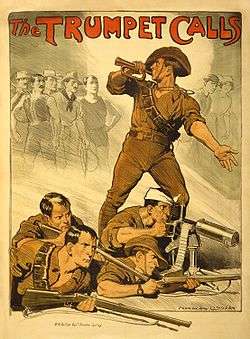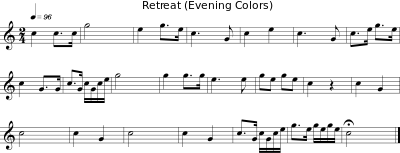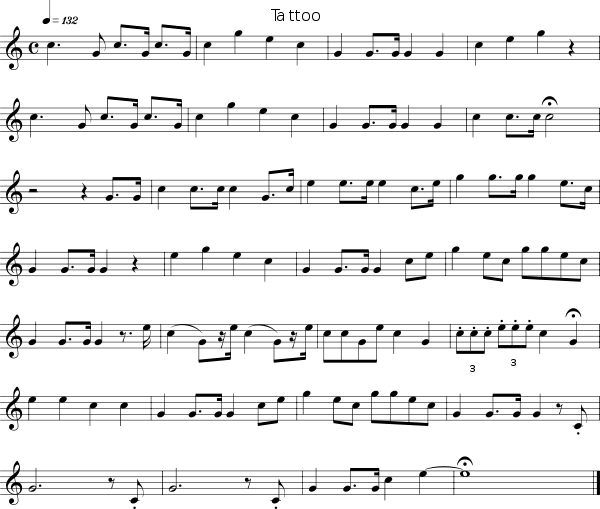Bugle call
A bugle call is a short tune, originating as a military signal announcing scheduled and certain non-scheduled events on a military installation, battlefield, or ship. Historically, bugles, drums, and other loud musical instruments were used for clear communication in the noise and confusion of a battlefield. Naval bugle calls were also used to command the crew of many warships (signaling between ships being by flaghoist, semaphore, signal lamp or other means).
A defining feature of a bugle call is that it consists only of notes from a single overtone series. This is in fact a requirement if it is to be playable on a bugle or equivalently on a trumpet without moving the valves. (If a bandsman plays calls on a trumpet, for example, one particular key may be favored or even prescribed, such as: all calls to be played with the first valve down.)
Bugle calls typically indicated the change in daily routines of camp. Every duty around camp had its own bugle call, and since cavalry had horses to look after, they heard twice as many signals as regular infantry. "Boots and Saddles" was the most imperative of these signals and could be sounded without warning at any time of day or night, signaling the men to equip themselves and their mounts immediately. Bugle calls also relayed commanders' orders on the battlefield, signaling the troops to Go Forward, To the Left, To the Right, About, Rally on the Chief, Trot, Gallop, Rise up, Lay down, Commence Firing, Cease Firing, Disperse, and other specific actions.[1]
Bugle calls


- Adjutant's Call: indicates that the adjutant is about to form the guard, battalion, or regiment.
- Alarm (as played by Sam Jaffe near the end of Gunga Din)
- Assembly: Signals troops to assemble at a designated place.
- Attention: Sound as a warning that troops are about to be called to attention.
- Boots and Saddles: Sounded for mounted troops to mount and take their place in line.
- Call to Quarters: Signals all personnel not authorized to be absent to return to their quarters for the night.
- Charge: Signal to execute a charge: gallop forward into harm's way with deadly intent.
- Church Call: Signals religious services are about to begin.
The call may also be used to announce the formation of a funeral escort from a selected military unit. - Drill Call: Sounds as a warning to turn out for drill.
- Fatigue Call: Signals all designated personnel to report for fatigue duty.
- Fire Call: Signals that there is a fire on the post or in the vicinity. The call is also used for fire drill.
- First Call: Sounds as a warning that personnel will prepare to assemble for a formation.
- This call is also used in horse racing, where it is known as Call to the Post. In that context, it indicates that jockeys need to have their mounts in position to be loaded into the starting gate.
- First Sergeant's Call: Signals that the First Sergeant is about to form the company.
- Guard Mount: Sounds as a warning that the guard is about to be assembled for guard mount.
- Last Post is a bugle call used at Commonwealth of Nations military funerals and ceremonies commemorating those who have been killed in a war.
- Mail Call: Signals personnel to assemble for the distribution of mail.
- Mess Call: Signals mealtime.
- Officers Call: Signals all officers to assemble at a designated place.
- Pay Call: Signals that troops will be paid.
- Recall: Signals duties or drills to cease.
 |
|
| Problems playing this file? See media help. | |
- Retreat:
- Formerly, called in action for troops to retreat.
- Signals the end of the official day. This bugle call is very close to Sunset used in the U.K. and the Commonwealth realms.
This call is also used to introduce Act 3 of La damnation de Faust of Hector Berlioz.
 |
Reveille
|
| Problems playing this file? See media help. | |
- Reveille: Signals the troops to awaken for morning roll call.[2]
- The Rouse
- School Call: Signals school is about to begin.
- Sick Call: Signals all troops needing medical attention to report to the dispensary.
- Stable Call: Signals troops to feed and water horses. Lyrics dating to 1852 Sumner's March to New Mexico: "Come off to the stables, all if you are able, and give your horses some oats and some corn; For it you don’t do it, the colonel will know it, And then you will rue it, as sure’s you’re born."
- Swimming Call: Signals the start of the swimming period.
 |
|
| Problems playing this file? See media help. | |
- Taps: Signals that unauthorized lights are to be extinguished.
This is the last call of the day.
The call is also sounded at the completion of a U.S. military funeral ceremony.
 |
|
| Problems playing this file? See media help. | |
- Tattoo: Signals that all light in squad rooms be extinguished and that all loud talking and other disturbances be discontinued within 15 minutes.
- To Arms (Signals all troops to fall under arms at designated places without delay.)
 |
|
| Problems playing this file? See media help. | |
- To The Colors, or To the Color
To the Colors is a bugle call to render honors to the nation. It is used when no band is available to render honors, or in ceremonies requiring honors to the nation more than once. To the Color commands all the same courtesies as the National Anthem.
The most common use of To The Colors is when it is sounded immediately following Retreat when the National Color is being lowered for the day.
Popular culture
Many of the familiar calls have had words made up to fit the tune. For example, the U.S. Reveille goes:
- I can't get 'em up,
- I can't get 'em up,
- I can't get 'em up this morning;
- I can't get 'em up,
- I can't get 'em up,
- I can't get 'em up at all!
- The corporal's worse than the privates,
- The sergeant's worse than the corporals,
- Lieutenant's worse than the sergeants,
- And the captain's worst of all!
- < repeat top six lines >
and the U.S. Mess Call:
- Soupy, soupy, soupy, without a single bean:
- Coffee, coffee, coffee, without a speck of cream:
- Porky, porky, porky, without a streak of lean.[3]
and the U.S. Assembly:
- There's a soldier in the grass
- With a bullet up his ass
- Take it out, take it out
- Like a good Girl Scout!
Irving Berlin wrote a tune called, "Oh, How I Hate to Get Up in the Morning". In a filmed version of his musical, This Is the Army, he plays a World War I doughboy whose sergeant exhorts him with this variant of words sung to "Reveille": "Ya gotta get up, ya gotta get up, ya gotta get up this morning!" after which Berlin sang the song.
"Taps" has been used frequently in popular media, both sincerely (in connection with actual or depicted death) and humorously (as with a "killed" cartoon character). It is the title of a 1981 movie of the same name.
First call is best known for its use in thoroughbred horse racing, where it is also known as the Call to the Post. It is used to herald (or summon) the arrival of horses onto the track for a race.
Another popular use of the "Mess Call" is a crowd cheer at football or basketball games. The normal tune is played by the band, with a pause to allow the crowd to chant loudly, "Eat 'em up! Eat 'em up! Rah! Rah! Rah!"
See also
- Bugle calls of the Norwegian Army
- Bugle and trumpet calls of the Mexican Armed Forces
- Military rites
- 1911 Encyclopædia Britannica article
| Wikimedia Commons has media related to Bugle calls. |
Notes
- ↑ Upton, Emory (1867). A New System of Infantry Tactics. pp. (appendix).
- ↑ "U.S. Army Bands — Bugle calls — Reveille". Retrieved 7 May 2011.
- ↑ Sperber, Hans (1951). "Bugle Calls" 1. Indiana University Press: 167–170. JSTOR 4317288.
External links
- Bugle Calls by the U.S. Scouting Service Project
- Official US Army Band Bugle Call Webpage
- US Navy Manual For Buglers
- British Army Bugle Calls (Duke of Edinburgh's Royal Regiment)






